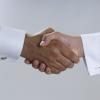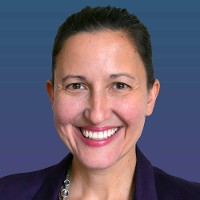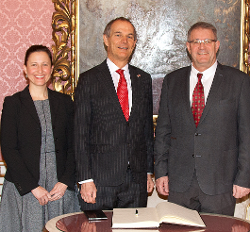
Options Magazine, Summer 2021: IIASA alumna and current Director of International Affairs and Science Diplomacy at the American Association for the Advancement of Science (AAAS), Kim Montgomery, highlights the role of science diplomacy in successfully addressing global challenges.
 © Kim Montgomery © Matthew Sharp
© Kim Montgomery © Matthew Sharp
The world is facing global challenges ranging from the current COVID-19 pandemic to climate change and food and water insecurity. Science will be central to the progress of solutions and diplomacy will be needed to ensure their development and implementation. Thus, scientists, decision makers, and governments – at the local, national, regional, and global levels – must work together. This will not be an easy task and it will require greater understanding and cooperation between the scientific, policy, and foreign affairs communities.
A framework for science diplomacy was developed through a meeting hosted by the American Association for the Advancement of Science (AAAS) and the Royal Society of London (RS) in 2009. The report, published in 2010, reviews the framework’s three dimensions of science diplomacy: (1) science in diplomacy where scientific evidence informs policymaking, (2) diplomacy for science to foster international scientific cooperation, and (3) science for diplomacy to utilize science’s soft power to improve relations between countries.
As part of my current role as the Director of International Affairs and Science Diplomacy at AAAS, I have the privilege to direct the Center for Science Diplomacy. Established in 2008, the center provides thought leadership through its Science & Diplomacy journal, collaborates with international partners including The World Academy of Sciences (TWAS) to offer science diplomacy trainings, and works to establish and maintain scientific collaborations even when diplomatic relations are strained or severed.
IIASA is an affiliate of AAAS, which is personally exciting for me as an IIASA alumna and member of the IIASA community. The institute is a leading example of a science diplomacy institution that was founded to promote scientific collaboration between the West and the East. Its charter, signed at the RS headquarters in London in 1972, structures an organization with science diplomacy goals – decades before the RS and AAAS conceptualized the framework of science diplomacy.
 © Markus Rauchenwald | IIASA
© Markus Rauchenwald | IIASA
Kim Montgomery with Leigh Turner (UK Ambassador to Austria and UK Permanent Representative to the United Nations) and Albert van Jaarsveld (IIASA Director General).
Working in external relations at IIASA was instrumental in expanding my science policy experience, which had been developed working at US science agencies and for the US Congress, to include firsthand experience in international science. I had the opportunity to work with national member organizations to highlight and foster member activities, as well as initiate a value proposition for IIASA membership. This experience provided me with insights into the opportunities and potential roadblocks to international scientific collaboration.
With global challenges spanning borders and science and technology driving towards solutions, there is an increasing role for science diplomacy. I am excited to utilize my experiences in academia, policy, and international organizations to help bridge the scientific, policy, and foreign affairs communities. To effectively do that, however, a coalition involving diverse scientific disciplines and policy stakeholders from local, national, regional, and global levels is needed. I look forward to working with AAAS’ partners, including IIASA, to strengthen that coalition and meet this pressing need for science diplomacy.
By Kim Montgomery